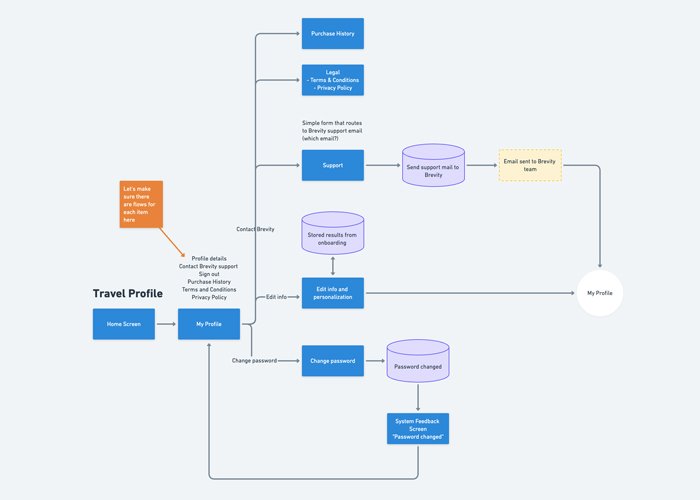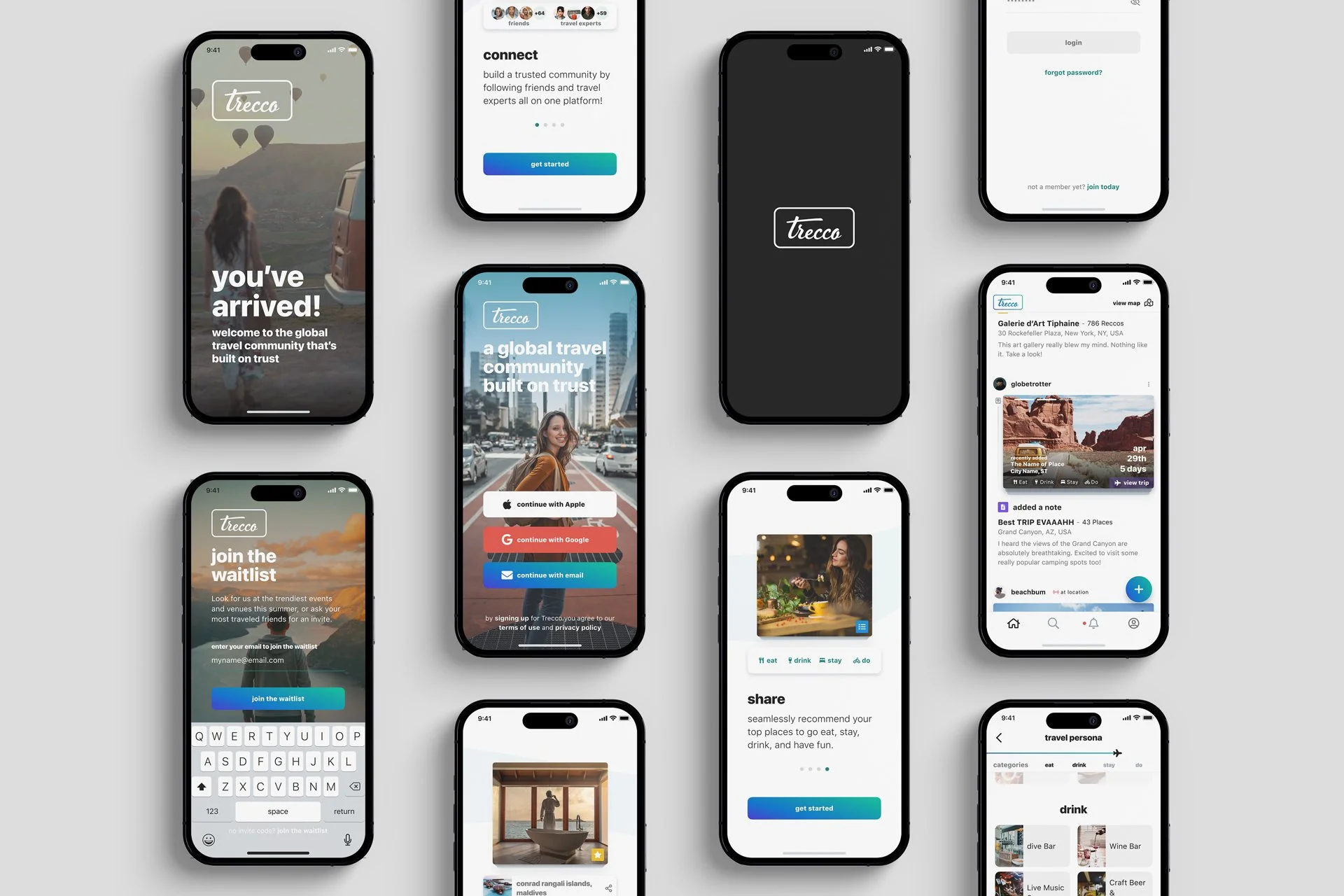Travel Planning, Reimagined
Trecco
Consumer Mobile App, Social Discovery & Sharing, TravelTech
Trecco is an innovative mobile app that brings travel enthusiasts together in a virtual world of exploration and shared stories. With social‑media‑style features, multimedia content, and rich travel resources, it offers a space where users can connect, discover new destinations, and organize travel experiences effortlessly.
Platforms
iOS
Android
Web
My Role
Product Design
UX Architecture
Data Flow
Client Communication
Business Challenge
Travel planning often involves juggling multiple sources—blogs, social platforms, word‑of‑mouth—and it can quickly become overwhelming. Trecco aimed to simplify this by creating a cohesive community‑driven platform where users could share, discover, and arrange travel effortlessly. The challenge: design an engaging, intuitive, scalable platform that encourages contribution, supports travel discovery, and makes planning fun and efficient.
Research Methods
To ensure Trecco was truly aligned with traveler needs and habits, we employed a comprehensive, multi-faceted research approach combining qualitative and quantitative insights:
User Surveys – We surveyed over 200 travelers, capturing how they plan trips, the challenges they face, and the tools they currently rely on. These surveys highlighted common pain points such as fragmented information sources, difficulty discovering trustworthy recommendations, and the time-consuming nature of trip organization. This data provided a foundation for designing features that directly addressed user frustrations.
Competitor Analysis – We conducted an in-depth review of leading travel platforms, including TripAdvisor, Google Travel, and Instagram. By studying both their successes and limitations, we identified gaps in social engagement, content curation, and collaborative planning. This informed our design strategy, allowing us to create a platform that combined the best practices of competitors while introducing unique community-driven functionality.
Usability Testing – Early prototypes were tested iteratively with a group of travel enthusiasts and early adopters. Observing users interact with the app revealed friction points, confusing flows, and areas where discoverability could be improved. These insights directly guided navigation design, feature prioritization, and interaction patterns, ensuring the product was intuitive and enjoyable to use.
Behavioral Analysis – To complement direct user research, we analyzed engagement trends from travel forums, blogs, and online communities. This helped us understand how users share experiences, seek recommendations, and engage with travel content online. By identifying patterns in content creation and consumption, we informed the app’s social and collaborative features, ensuring they aligned with real user behavior.
Outcome – By combining these research methods, we gained a deep, holistic understanding of our users, their needs, and the broader travel ecosystem. This foundation ensured that every design decision—from workflows to interactions—was grounded in evidence and tailored to create a seamless, community-driven travel experience.
Failed Iterations & Key Learnings
Social Feed vs. Curated Lists – Our first iteration introduced a real-time social feed, similar to popular social platforms, aiming to encourage constant interaction and content discovery. However, usability testing revealed that travelers felt overwhelmed by the endless stream of posts and struggled to find relevant recommendations. Users expressed a preference for structured, curated lists that provided clear, actionable insights for planning trips. In response, we shifted to a list-based approach that prioritized quality over quantity, balancing exploration with usability.
Complex Filtering System – Early prototypes included a comprehensive filtering system designed to help users refine search results by location, activity, budget, and more. While feature-rich, this system proved too complicated, causing cognitive overload and slowing down discovery. To address this, we introduced smart tagging, AI-powered recommendations, and contextual filters that dynamically adapted to user behavior. This simplified the experience, helping travelers quickly find relevant content without getting lost in options.
Trip Planner Feature – The initial trip planner required users to manually create itineraries, adding destinations, dates, and activities step by step. Testing showed that this process was tedious and time-consuming, especially for users planning multi-destination trips. To improve usability, we pivoted to a collaborative trip planner that allowed users to save, organize, and share places efficiently. This feature supported both solo and group planning, streamlined workflows, and encouraged engagement within the community.
Key Learnings – These iterations reinforced the importance of testing assumptions early and often. Real user feedback revealed where our designs created friction and guided us to solutions that were simpler, more intuitive, and aligned with actual user behavior. By embracing an iterative, evidence-driven approach, we were able to refine features, optimize workflows, and create a travel experience that was both engaging and easy to use.
Metrics & Outcomes
📈 60% Increase in User Engagement – The redesigned Trecco platform successfully encouraged users to explore, share, and interact with travel content more frequently. Through simplified navigation, intuitive workflows, and community-driven features, engagement surged by 60% within the first three months post-launch, reflecting stronger user interest and satisfaction.
💬 High Community Participation – By focusing on structured content discovery and collaborative trip planning, users contributed 35% more content than initially projected. This increase in user-generated posts, reviews, and recommendations validated the effectiveness of the community-centered design and fostered a vibrant, active travel community.
🔄 40% Faster Trip Planning – Streamlined workflows, curated lists, and smart recommendations enabled users to plan trips significantly faster compared to traditional research methods. What previously took hours could now be completed in a fraction of the time, enhancing the overall travel planning experience.
👥 Strong User Retention – The combination of intuitive design, engaging features, and meaningful social interaction resulted in a 70% retention rate among early users. This demonstrated that Trecco not only attracted users but also provided ongoing value, keeping travelers returning to the platform for planning and inspiration.
Overall Impact – By leveraging user-centered research, iterative design, and data-informed decision-making, Trecco transformed from a conceptual idea into a highly engaging, efficient, and community-driven travel platform. The measurable improvements in engagement, content contribution, planning speed, and retention highlight the real-world value of combining thoughtful UX design with strategic insights.
Key Takeaways
Deep User Research – By engaging directly with travelers through surveys, interviews, and behavioral analysis, we uncovered key pain points and unmet needs. These insights informed design decisions at every stage, ensuring the platform addressed real-world frustrations and delivered meaningful value.
Iterative Testing & Feedback Loops – Continuous prototyping, usability testing, and feedback collection allowed us to refine features, workflows, and interactions based on actual user behavior. This iterative approach ensured that every design change improved usability, discoverability, and overall satisfaction.
Simplicity Over Complexity – By prioritizing clarity, intuitive flows, and streamlined interactions, we reduced cognitive load and made planning and sharing travel experiences effortless. Simplifying complex workflows was essential to creating a seamless and enjoyable user experience.
Community-Driven Travel Experience – Trecco successfully empowered travelers to connect, share, and plan collaboratively. The platform fostered engagement, inspired discovery, and provided an intuitive, community-centered approach to travel planning that resonated with users and encouraged ongoing participation.
Awards & Recognition
The public release of Trecco was met with widespread acclaim, reflecting the impact of thoughtful design, user-centered research, and innovative community-driven features. The platform’s combination of intuitive workflows, engaging visuals, and seamless social interactions earned recognition across multiple prestigious award programs:
Platinum Hermes Award, Mobile App Category (2022) – Honored for outstanding creativity, functionality, and overall excellence in mobile app design, highlighting Trecco’s ability to deliver a compelling user experience.
Davey Awards (2021) –
Mobile Features, Best Visual Design, Aesthetic: Best in Show – Recognized for Trecco’s visually striking interface and cohesive brand identity, which enhanced user engagement and satisfaction.
Mobile Features, Best User Interface: Gold – Celebrated the intuitive navigation, smooth interactions, and usability improvements that made complex travel planning effortless.
Mobile Apps/Sites, Travel: Silver – Acknowledged Trecco as an innovative solution in the travel category, effectively combining social features with practical trip planning tools.
These accolades validate the design process and the impact of applying Discover → Define → Design → Deliver methodologies to create a product that resonates with users while setting new standards in mobile travel experiences.



